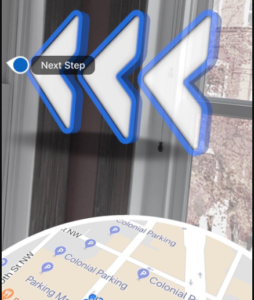Augmented Reality in Google Maps: Implications for Local SEO
In February, select individuals were able to try out a new augmented reality (AR) feature that Google hopes to implement in Google Maps. With a technique called ‘global localization’, Google Maps will soon offer the ability to point your phone’s camera at buildings and nearby landmarks and receive real-time, up to date directions leading you to your destination. By utilizing visual positional service (VPS), street view, and machine learning, the feature looks to solve the issue of the ‘wandering blue dot’ that can sometimes appear across the street or a block away from the user’s actual location.
The AR feature, available for pedestrian maps only, will hopefully roll out soon. With no official launch date, the route-finding feature has time to test and improve its function in terms of user experience (UX) and platform optimization.
Potential Issues
 Users have already noticed several potential issues with Google Maps AR. For example, the buildings used to pinpoint a user’s location could be distorted by trees, heavy cloud cover, and other environmental factors. Google hopes by combining the three algorithms, these possible issues would be accounted for.
Users have already noticed several potential issues with Google Maps AR. For example, the buildings used to pinpoint a user’s location could be distorted by trees, heavy cloud cover, and other environmental factors. Google hopes by combining the three algorithms, these possible issues would be accounted for.
Impact on Local Businesses
Once the feature is released to the general public, Google could have the ability to filter spammy businesses out of their Google Business Profile feature by assessing whether or not the store front is a legitimate business or a random location. This will make storefront photos increasingly important to Google Business Profile profiles.
One question Google will have to answer with this feature is how businesses within a large building with multiple suites will be counted or represented. Due to the possibility of multiple businesses sharing the same location with different suite numbers, the AR feature will have to work around the lack of distinguishable storefront business elements.
With this emerging AR feature, working towards a clear and visible real-world branding that ties your business to your location, as well as a cohesive online presence, is even more critical Just as search tools and navigation apps are important for users, AR could prove be just as important to Google in their continued quest towards delivering accurate and reliable information.






